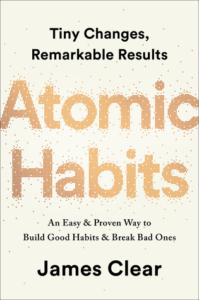ATOMIC HABITS | James Clear | 2018 | Non-fiction
This is one of those books that seem to be on everyone’s lips or to read list and I can understand why. It’s a cracker. If you’re after some simple tips to creating good habits and/or ditching a few bad ones then this is your go-to guide.
The author starts with the obligatory background to his young life; a horrific accident and recuperation makes an interesting read. He’s clever too. Thus the stage is set for the exposition of how he rehabilitated his physical, emotional and student life as he explored what makes for good habits. In the process he uncovered four laws of behaviour change which forms the basis for the book.
If we take as a premise that will-power alone will not reinforce good habits as it’s a finite resource then we’re left with creating systems to build or break our habits. He uses the fitness analogy often: if we have a goal of losing weight we could use will-power alone to reach our goal but how long will our will-power actually last? Goals are finite; systems are infinite. This means that if we build a system to reach our weight loss goal we are more likely to stick with it rather than rely on our failing will-power.
So the systems that we build, he suggests should be based on four opposing positive and negative attributes ranging from effortless to difficult. That is: make the habit obvious rather than invisible, attractive as opposed to ugly, easy instead of hard and satisfying rather than unsatisfying. The book gives many examples and advice from successful people who have created good, lasting habits. He addresses the importance of creating the identity of someone who has the habits we desire: become the type of person who exercises regularly, practises piano, volunteers at a charity, keeps to a budget. He does give us a break though and advises that it’s better to do less than nothing and that it’s better to start small, scale it down rather than attempt more than we can handle and then give up.
There’s much to recommend this book as a roadmap to achieving and sustaining good habits and lessening the ones that diminish us. As he says the way to success is to redesign our life so that the actions that matter most are the easiest to do.

